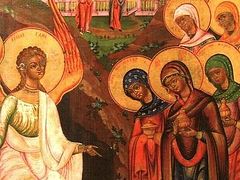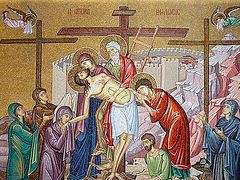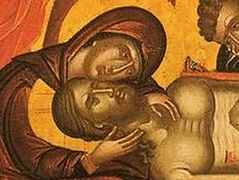There is no week so full of services, experiences, prayers, and reflections as Holy Week. It gives so much to the soul… And, most often, it takes so much energy… Both spiritual and bodily, especially if someone is not on vacation or doesn’t have a break, and thus isn’t free from his usual duties. Every day of this week is dedicated to memories of events that directly relate to us, to us our lives, to eternal salvation. More than ever, we are acutely aware that everything that the Lord suffered and bore during His earthly ministry was for our sakes. These persecutions, reproaches, sufferings, and death… And how heavy it is on the soul, what pain you experience, when you suddenly feel with your heart, not your mind, at least a little bit of how much you are to blame for all of this. You are even more guilty because you usually live day to day as if none of this happened. Only in Holy Week do you wake up. You don’t pass by the Crucifix like you usually do, but you stop before it and gaze upon it, suddenly struck by such a clear and simple thought: All of this was for your sake.
And here comes the final day of this amazing and difficult week—Holy Saturday. We have celebrated the rite of burial. The prophecy of Ezekiel about the bones that come to life has sounded forth. The Pharisees went, and made the sepulchre sure, sealing the stone, and setting a watch. All fifteen paramoia have been read, and the clergy vestments are no longer black, not purple, but white.
And everything is filled with the expectation of the triumph, the feast—Pascha. [In ordinary years], tables are already set up outside with kulichi, Pascha cheese, and eggs waiting for the priest with the holy water and his three Paschal candles and the Sunday troparion (!) in the second tone: “When Thou didst descend unto death, O Life Immortal…” And at home—so much care and bother: not much time left until that night, joyful and light-bearing. There is so much yet to be cleaned, picked up, cooked, baked! And indeed, it’s necessary…
And somehow, unlike all the other days of this week, the content of this day is lost, forgotten, or even not noticed at all. What content? This content:
Moses the great mystically prefigured this present day, saying: / “And God blessed the seventh day.” / For this is the blessed Sabbath, this is the day of rest, / on which the only-begotten Son of God rested from all His works. / Suffering death in accordance with the plan of salvation, / He kept the Sabbath in the flesh; / and returning once again to what He was, / through His Resurrection He has granted us eternal life, // for He alone is good and loves mankind (Holy Saturday Matins, Praises on Glory…).
The day of rest—for the Son of God, Who rested from His works; and our rest. The day of that rest that is necessary, in order to, having rid ourselves of everything that surrounds us every day and every hour, reflect upon that which happened once on Golgotha and afterwards. No, it’s not possible to come to an understanding of this with our tiny human minds. But we must divest ourselves, calm down, and give the Lord Himself the chance to reveal to us what pleases Him, and what we can accommodate at least to some degree.
After all, without this there will be no true Paschal joy. It will be a foolish, childish happiness. Not childlike in the sense that Christ uses when He says, Except ye … become as little children, but in a completely different sense: not quite sensible, natural, psychological-fleshly, and in no way spiritual. And it quickly passes, disappears, leaving us to wonder: Why is it that Bright Week is at our doorstep, and we sing and exclaim, “Christ is Risen!” but we don’t feel any joy yet?
Of course, we can’t get away from worries and cares on Saturday, even though it be Holy Saturday. We’re not Jews (in this case, unfortunately), who know how to do nothing on this day except that which is absolutely necessary, even if it’s not really filled with the same meaning for them as for us. We have to clean, and cook, and even go to some stores [in normal years].
But let us still remember—let’s try at least—He Who is immeasurably more important than all of this; by Whose sufferings, death, and Resurrection we are saved; with Whom a stale piece of black bread is sweeter than Pascha cheese and an iced kulich with filing; Who ever looks upon us with love and regret (alas!), including on this—so restless—day of rest.





